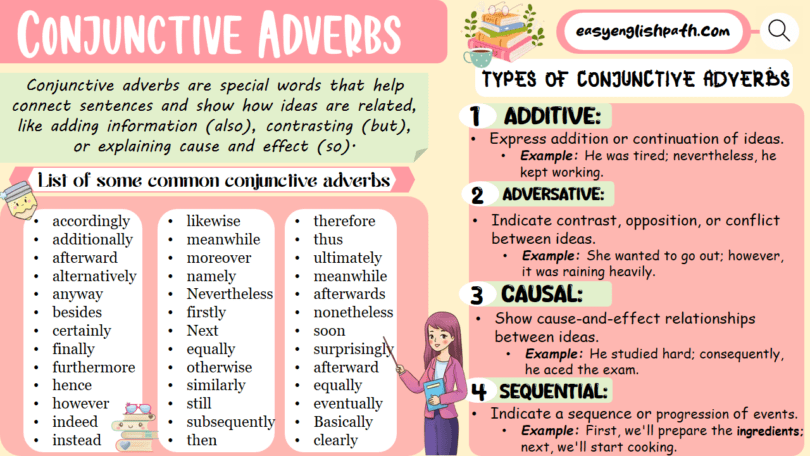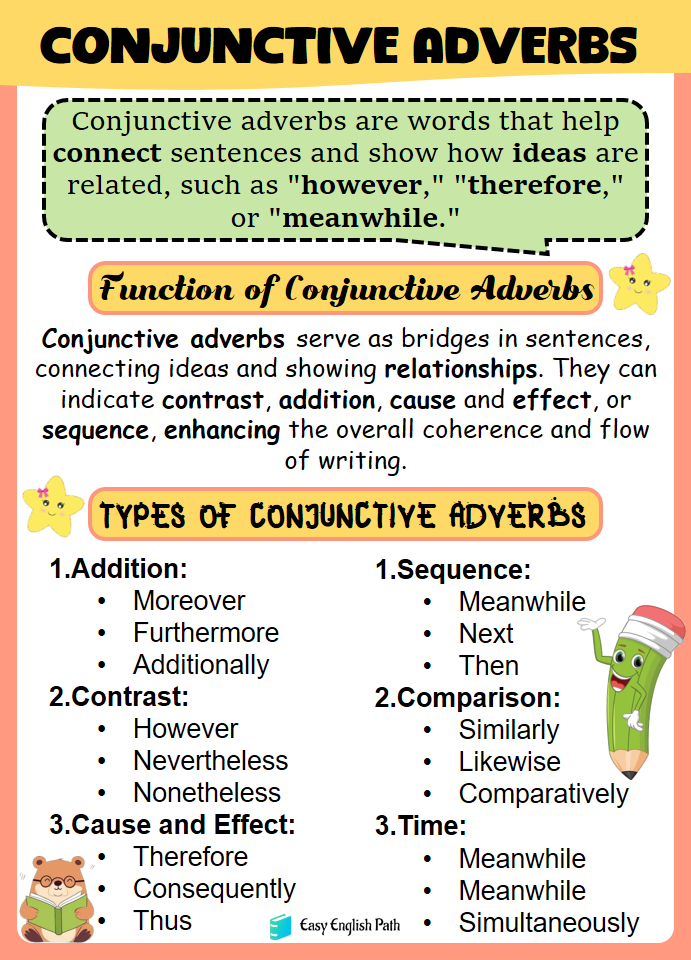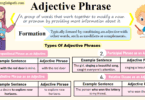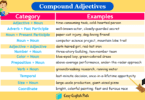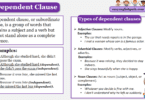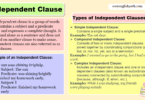Conjunctive adverbs are essential words in writing that connect ideas and show relationships between sentences. These words help clarify meaning and improve the flow of your writing. By using conjunctive adverbs, you can indicate addition, contrast, cause and effect, sequence, and emphasis
Definition of Conjunctive Adverb:
Conjunctive adverbs are used to join two independent clauses or sentences together. They often indicate a relationship between the two clauses, such as contrast, cause and effect, comparison, or sequence.
Examples:
- She is talented; however, she lacks confidence.
- He studied all night; therefore, he aced the exam.
- They wanted pizza; meanwhile, she craved sushi.
- He missed the bus; consequently, he was late for work.
List of Conjunctive Adverbs
| accordingly | also | anyway | besides | certainly |
| consequently | finally | furthermore | hence | however |
| indeed | instead | likewise | meanwhile | moreover |
| nevertheless | nonetheless | otherwise | similarly | subsequently |
| then | therefore | thus |
Common Uses of Conjunctive Adverb
1. Adding Information
Conjunctive adverbs can be used to add information to the previous statement.
- Examples:
- She loves to travel; moreover, she enjoys learning new languages.
- The project is due next week; furthermore, we need to prepare a presentation.
- The weather is warm; additionally, it’s a perfect day for a picnic.
2. Showing Contrast
Conjunctive adverbs can be used to show contrast or opposition between two ideas.
- Examples:
- He is very talented; however, he lacks discipline.
- I wanted to go to the party; nevertheless, I decided to stay home.
- The team worked hard; on the other hand, they didn’t achieve the desired results.
3. Indicating Cause and Effect
Conjunctive adverbs can indicate a cause-and-effect relationship.
- Examples:
- The roads were icy; therefore, driving was dangerous.
- She didn’t study for the exam; consequently, she didn’t pass.
- He didn’t set an alarm; thus, he overslept.
4. Showing Sequence or Time
Conjunctive adverbs can show the sequence or timing of events.
- Examples:
- First, we visited the museum; then, we had lunch at a café.
- She finished her homework; afterward, she watched a movie.
- He completed the project; subsequently, he presented it to the team.
5. Emphasizing a Point
Conjunctive adverbs can be used to emphasize a point or idea.
- Examples:
- The experiment was a success; indeed, it exceeded all expectations.
- This task is challenging; in fact, it’s the hardest we’ve ever faced.
- The book is fascinating; certainly, it is worth reading.
Conjunctive Adverbs Examples:
- I wanted to go; however, I had to cancel.
- He tried his best; nevertheless, he didn’t win.
- She practiced daily; consequently, she improved quickly.
- It’s hot outside; indeed, it’s summer.
- She forgot her keys; therefore, she couldn’t enter.
- I’ll finish the project; otherwise, I’ll ask for help.
- He woke up late; hence, he missed the bus.
- It was a tough race; still, he crossed the finish line.
- The store is closed; nonetheless, we can try another.
- I have a meeting; thus, I can’t stay long.
You May Also Like this

